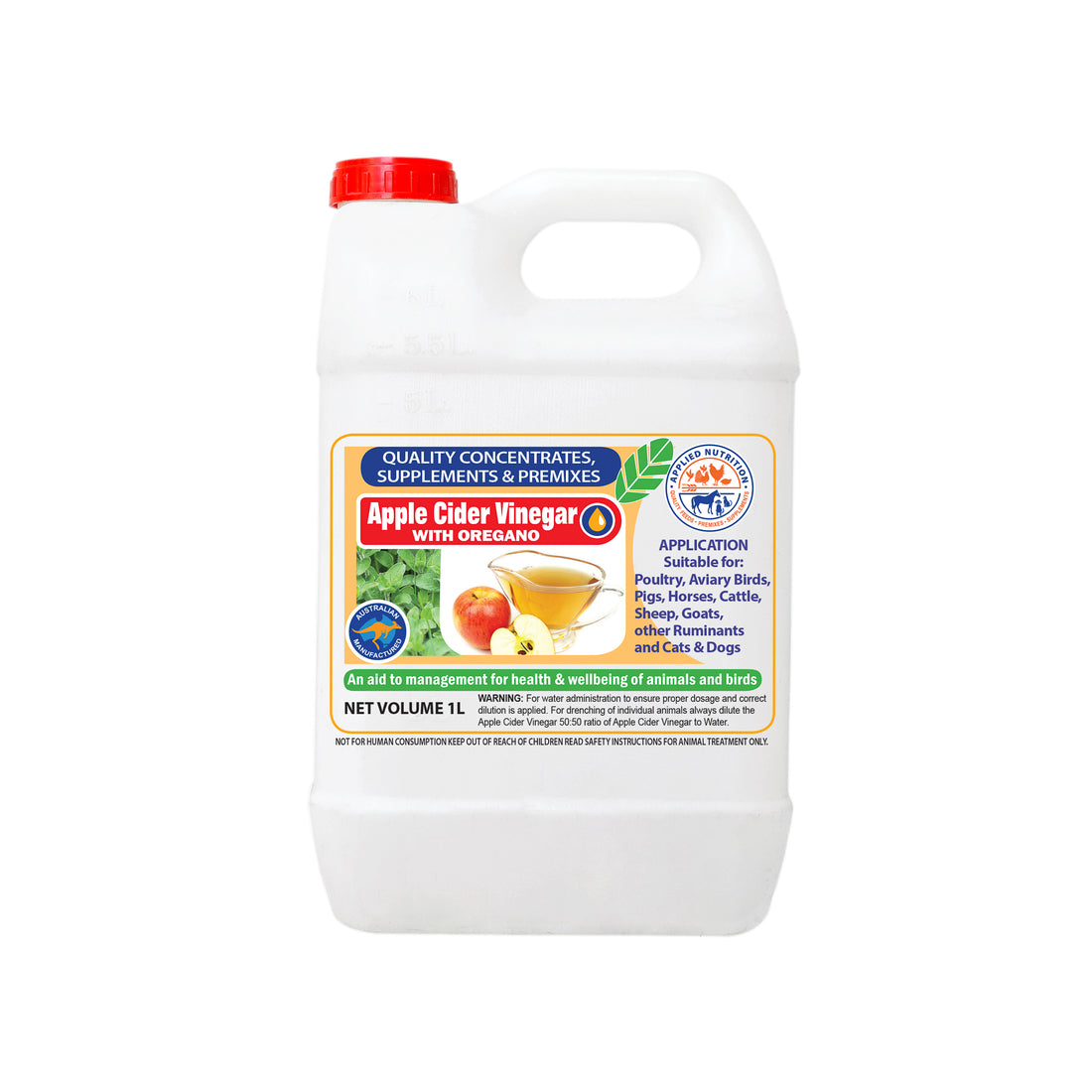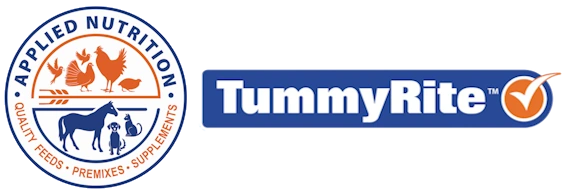
APPLE CIDER VINEGAR WITH OREGANO – AN AID TO BIRD HEALTH MANAGEMENT AND WELLBEING
Applied Cider Vinegar (ACV) has been used as an aid to both human and bird health. It has been promoted by numerous veterinarians over the years as a means of increasing the acidity (lowering the pH) of the gastrointestinal tract (GIT) which in turn improves the acidic environment of the upper part of the GIT. Many enzymes (Pepsin) in the proventriculus are activated at a low pH. The feed/food that is eaten in many instances acts as a buffer encouraging the pH to rise. ACV helps to keep the pH down. Pathogenic organisms do not thrive in an acidic environment. Many of the favourable bacteria within the GIT, such as Lactobacillus and Bifidobacteria are tolerant and thrive in an acidic environment. Organic acids, such as acetic acid, the organic acid in ACV, are commonly used in feed and water as a replacement to antibiotics. Antibiotics used in feeds for “growth promotion” are now banned in many countries, including Australia due to antibiotic resistant strains predominating because of overuse. Routine use of antibiotics is not recommended in aviaries or bird rooms and should only be used under veterinary supervision to avoid the increase in the population of resistant strains of pathogens.
Creating an environment in the GIT that is unfavourable to the proliferation of pathogens is a sensible way of reducing the disease challenges to birds.
Suggested Mode of Action
Acidifiers have two suggested modes of action, (Stonerock, 2007). The first mode of action is the reduction of the pH in the digestive tract. Reduction in the pH happens when acids dissociate in the liquid environment in the GIT and liberate hydrogen ions (Protons, H+). The hydrogen ions come from the dissociation of the acid; the acetic acid dissociates into H+ and Acetate– ions. At very low pH (≤ 3.0) protons leak across the bacterial membrane faster than the bacterial cell can remove them. This causes intracellular acidification to a degree that it disrupts the biochemical processes in the bacterial cell, destroying the cell, (Stonerock, 2007).
The antimicrobial activity and effectiveness of organic acids is influenced significantly by the amount of dissociation of the organic acid which in turn is governed by the pH of the environment. The amount of dissociation is different for each organic acid and is defined by the pK constant (dissociation constant) of the acid. This constant is defined at the 50% dissociation rate. This means 50% is in ionic form and 50% in non-ionic form. In practice organic acids exist in both forms, dissociated and non-dissociated. The second mode of action is based on the non-dissociated form penetrating the bacterial cell wall by traversing the membrane and disrupt the normal processes of certain types of bacteria, (Stonerock, 2007).
Oregano Essential Oil (OEO)
Wild Oregano (Origanum vulgare) is a herb that is rich in phenols. Carvacrol is the most studied component. Synthetic versions of Carvacrol have been used for over fifty years, for disinfecting work surfaces and instruments, because of its strong antibacterial properties. Carvacrol is characterized by a spicy bitter taste and is an important component of wild oregano. Wild Oregano is sometimes confused with the sweet Oregano, which is used in the kitchen, but this spice is of a different type of plant (Origanum majorana), has a different composition and therefore, other properties.
An important part of the activity of Oregano can be ascribed to Carvacrol. Oregano Essential Oil consists of at least 70% of Carvacrol. Numerous scientific studies have shown that Carvacrol has a strong activity against a broad spectrum of micro-organisms. Against bacteria, including: Staphylococcus aureus, Escherichia coli, Pasteurella multocida, Streptococcus faecalis, Streptococcus agalactiae, Vibrio coli, Enterobacter aerogenes, Streptococcus uberis, Proteus rettgeri, Salmonella spp, Proteus vulgaris, Proteus mirabilis, Klebsiella pneumoniae, Corynebacterium pyogenes, Pseudomonas aeruginosa, Cryptosporidiae spp., Streptococcus pyogenes, Erysipelothrix insidiosa, Mycobacterium tuberculosis and Treponema hyodisaenteriae. Against fungi, including: Aspergillus spp, Mucor spp, and Candida spp. against parasites, among others, Eimeria spp (coccidiosis), and Histomonas meleagridis (“Blackhead”).
My Field Experiences with Oregano Essential Oil
Our Oregano essential oil is derived from the Wild Oregano plant (Origanum vulgare). Since 2005 Applied Nutrition has used Oregano essential oil in powdered form in our organic poultry feeds. As an aid to management both forms of application, powder and liquid have been used to assist organic and free-range poultry to cope with disease challenges. Since April 2014 we have included Oregano essential oil in powdered form in all our TummyRite™, Prosperity™ and StartRite™ range of products.
A more detailed description of the mode of action of both ACV and OEO and the components of OEO can be found in Applied Nutrition’s brochure on Apple Cider Vinegar with Oregano. Available on request.
We are now introducing the advantages of both products ACV with OEO, as an aid to management, to assist livestock, horses, poultry, pigeons, and aviculture birds to cope with disease challenges. Our ACV with OEO product is a 9% ACV and contains the “mother” and should be added at a rate of 3ml per litre of water. Each bottle is dosed individually with the correct level OEO. Give as required according to the health status of your aviaries and bird rooms. Available online at www.tummyrite.com.au in 1 litre and 5 litre bottles.
DISCLAIMER: We make no specific claims for this product to cure specific diseases.
However, our field experience with commercial organic and free-range poultry over many years has demonstrated the ability of the components in this product to assist poultry to cope with disease challenges. For severe disease challenges managers/keepers are encouraged to consult their Avian and/or Animal Veterinarian for advice and treatment.
